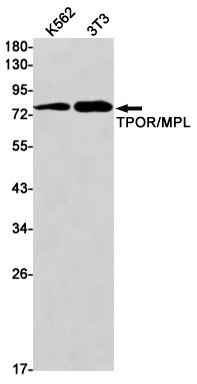
| WB | 1/500-1/1000 | Human,Mouse,Rat |
| IF | 咨询技术 | Human,Mouse,Rat |
| IHC | 咨询技术 | Human,Mouse,Rat |
| ICC | 技术咨询 | Human,Mouse,Rat |
| FCM | 咨询技术 | Human,Mouse,Rat |
| Elisa | 咨询技术 | Human,Mouse,Rat |
| Aliases | MPL; TPOR; Thrombopoietin receptor; TPO-R; Myeloproliferative leukemia protein; Proto-oncogene c-Mpl; CD110 |
| Entrez GeneID | 4352 |
| WB Predicted band size | Calculated MW: 71 kDa; Observed MW: 85 kDa |
| Host/Isotype | Rabbit IgG |
| Antibody Type | Primary antibody |
| Storage | Store at 4°C short term. Aliquot and store at -20°C long term. Avoid freeze/thaw cycles. |
| Species Reactivity | Human,Mouse,Rat |
| Immunogen | A synthetic peptide of human TPOR |
| Formulation | Purified antibody in TBS with 0.05% sodium azide,0.05%BSA and 50% glycerol. |
+ +
以下是关于Thrombopoietin Receptor(TPO-R)抗体的3篇代表性文献摘要(名称、作者及简要内容):
---
1. **文献名称**:*Romiplostim for the treatment of chronic immune thrombocytopenia: a review of clinical studies*
**作者**:Bussel, J.B., et al.
**摘要**:该综述总结了romiplostim(一种TPO-R激动剂抗体类药物)在治疗慢性免疫性血小板减少症(ITP)中的多项临床试验,证明其可显著提高血小板计数并减少出血风险,长期使用安全性良好。
2. **文献名称**:*Eltrombopag versus placebo for management of chronic immune thrombocytopenia (RAISE trial)*
**作者**:Cheng, G., et al.
**摘要**:该研究报道了口服TPO-R小分子激动剂eltrombopag在ITP患者中的随机对照试验结果,显示其较安慰剂显著提升血小板水平,且耐受性较好,但对肝功能异常患者需谨慎监测。
3. **文献名称**:*Thrombopoietin receptor agonists in myelodysplastic syndromes*
**作者**:Giles, F.J., et al.
**摘要**:探讨了TPO-R激动剂(如romiplostim)在骨髓增生异常综合征(MDS)患者中的应用,发现其可改善血小板减少,但需警惕潜在白血病转化风险,需进一步研究其适应症范围。
---
**注**:TPO-R抗体类药物(如romiplostim)属于重组蛋白类激动剂,而eltrombopag为小分子非抗体类激动剂,两者机制不同但均靶向TPO受体。以上文献均聚焦于临床转化研究,若需基础机制研究文献可进一步补充。
Thrombopoietin receptor (TPO-R), also known as c-MPL, is a cytokine receptor encoded by the *MPL* gene, primarily expressed on hematopoietic stem cells and megakaryocytes. It binds thrombopoietin (TPO), a key regulator of platelet production, activating signaling pathways like JAK-STAT, MAPK, and PI3K to promote megakaryocyte differentiation and platelet formation. Dysregulation of TPO-R signaling is linked to hematologic disorders, including thrombocytopenia and myeloproliferative neoplasms.
TPO-R-targeting antibodies have therapeutic and diagnostic applications. Agonistic antibodies (e.g., romiplostim) mimic TPO to stimulate platelet production in immune thrombocytopenia (ITP) or chemotherapy-induced thrombocytopenia. Conversely, antagonistic antibodies are explored to inhibit hyperactive TPO-R signaling in conditions like essential thrombocythemia. Autoantibodies against TPO-R are rare but implicated in some acquired amegakaryocytic thrombocytopenias, blocking receptor function and causing platelet deficiency.
Research also focuses on TPO-R antibodies as tools to study hematopoiesis or detect receptor expression in bone marrow disorders. Challenges include balancing efficacy with thrombotic risks in agonist therapies and minimizing off-target effects. Advances in antibody engineering, such as humanized or bispecific designs, aim to improve specificity and therapeutic outcomes. Overall, TPO-R antibodies represent a critical interface between hematology research and clinical innovation.
×